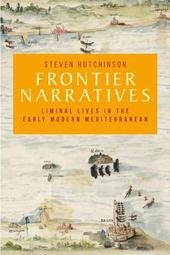
|
Frontier Narratives: Liminal Lives in the Early Modern Mediterranean
Paperback / softback
Main Details
| Title |
Frontier Narratives: Liminal Lives in the Early Modern Mediterranean
|
| Authors and Contributors |
By (author) Steven Hutchinson
|
| Series | Manchester University Press |
|---|
| Physical Properties |
| Format:Paperback / softback | | Pages:240 | | Dimensions(mm): Height 234,Width 156 |
|
| Category/Genre | Literary studies - c 1500 to c 1800 |
|---|
| ISBN/Barcode |
9781526167071
|
| Classifications | Dewey:909.09822 |
|---|
| Audience | |
|---|
| Illustrations |
5 black & white illustrations, 1 map
|
|
Publishing Details |
| Publisher |
Manchester University Press
|
| Imprint |
Manchester University Press
|
| Publication Date |
6 December 2022 |
| Publication Country |
United Kingdom
|
Description
This book uses a wide range of sources, factual and fictive, in many languages to examine how slaves and 'renegades' developed a frontier consciousness that took into account how the 'others' thought and acted, and how Muslims, Christians and Jews developed mutual understanding despite the hostile conditions of the early modern Mediterranean. -- .
Author Biography
Steven Hutchinson is Professor of Spanish at the University of Wisconsin-Madison -- .
Reviews'Frontier narratives is an innovative and fascinating book, a major achievement of interdisciplinary and comparative scholarship, and one that will significantly improve our understanding of the Mediterranean. It is destined to become a key point of reference, a book that will surely alter for the better the interdisciplinary directions of the field of Mediterranean Studies and beyond.' Luis F. Aviles, University of California Irvine, Caliope 'In this beautiful complement to Braudel's work on the Mediterranean, Hutchinson maps, in depth, the cultural tapestry woven through the multiplex interaction between Christian and Muslim political powers. Readers' eyes will become increasingly open regarding the thorny complexities of the entire situation. In this interdisciplinary, well written and timely work, he shows the cruelty exercised by both sides of the conflict, and in great abundance.' James Iffland, Boston University 'Steven Hutchinson's Writing the Early Modern Mediterranean is a game-changer. Hutchinson examines the shifting modalities of human identities and relationships in the Early Modern Mediterranean through the voices of those who actually experienced the Mediterranean frontier zone, locales of sustained interaction among followers of the three major Abrahamic religions. Meticulously researched and skillfully written, this book offers a more nuanced and complex view of the Mediterranean frontier that will alter or change altogether the standard view or "take" on life in that frontier zone of the Early Modern world.' Marsha Collins, University of North Carolina at Chapel Hill 'Hutchinson (Spanish, Univ. of Wisconsin, Madison) has produced a small book packed with stories of the exchange of people across the Mediterranean's religious frontiers in the early modern centuries. The writers of these fictional and factual accounts, mostly European, range from obscure to famous. The best known is Miguel de Cervantes, whose years as a captive in Algiers inspired his plays, novels, and short stories. Hutchinson argues that the fictions generally conform to what is known, and he uses them to embellish the book's four main chapters. He discusses captives first, as they made up the greatest numbers and were victims of any number of confrontations ranging from small kidnapping raids to piratical fleets' actions and episodes of war. Captives awaited ransom and repatriation, which could come quickly in battlefield exchanges or more slowly for individuals and smaller groups. Some of those forgotten ended up as slaves and converted. Of those, some married well and found success in their new religion, while others held important administrative or military positions, some becoming the scourge of their former coreligionists. Despite all the hostility, cordial relations could still cross religious lines.' --W. D. Phillips, emeritus, University of Minnesota Summing Up: Recommended. Advanced undergraduates through faculty. -- .
|